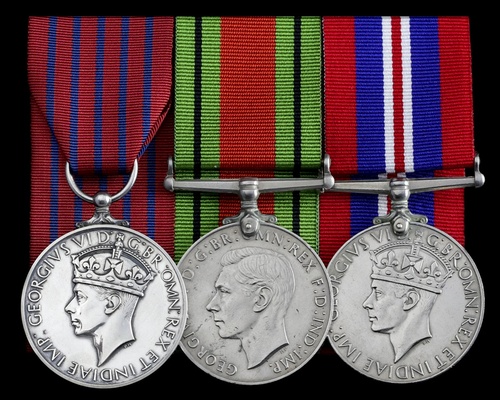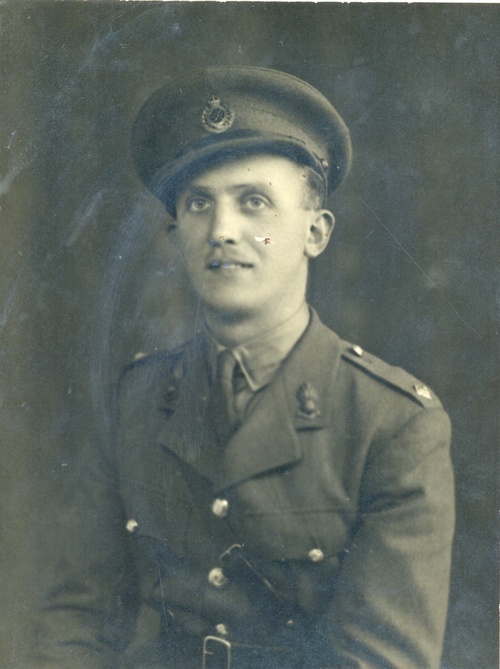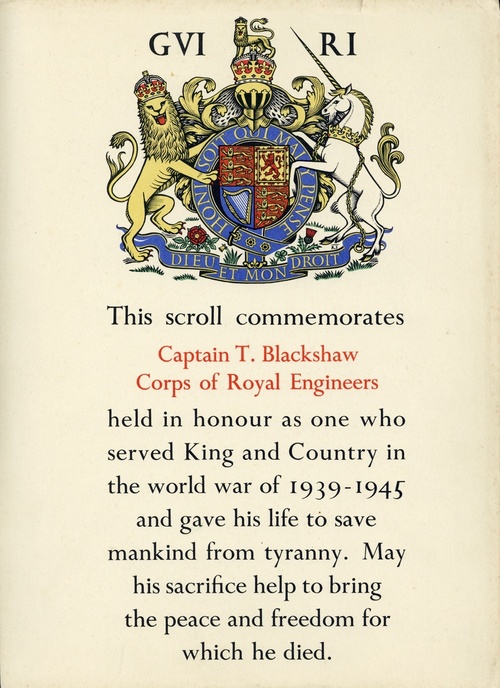Auction: 19002 - Orders, Decorations and Medals
Lot: 394
'In August 1943 he was awarded the George Medal. No award was more well or truly deserved. Though small in stature, he possessed the heart of a lion and no one who came in contact with him could help being affected by his cheerful personality.’
A comrade on Captain T. 'Tommy' Blackshaw, G.M., R.E.
A fine Second World War 'bomb disposal' George Medal group of three awarded to Captain T. 'Tommy' Blackshaw, Royal Engineers, who was decorated for his coolness and courage in making safe nearly 100 ‘butterfly bombs’ after an enemy raid on Essex in March 1943 - all of which were fitted with anti-handling devices designed to detonate at the slightest vibration or touch
He would tragically lose his life on 9 January 1945, being struck by a train whilst umpiring military exercises at Bideford Station
George Medal, G.VI.R., 1st issue (Lieut. Thomas Blackshaw); Defence and War Medals 1939-45, extremely fine (3)
G.M. London Gazette 17 August 1943:
‘In recognition of conspicuous gallantry in carrying out hazardous work in a very brave manner.’
The original recommendation - a joint citation with two other officers and an N.C.O. - states:
‘On the night of 3-4 March 1943, enemy aircraft dropped approximately 350 anti-personnel bombs on Essex. The bombs fell in open country and mostly on the surface. It was necessary to dispose of these bombs as soon as possible as they were holding up agriculture and could not be adequately guarded in the rural areas in which they fell.
Owing to an exercise the only officers available to deal with these bombs were Major L. Gerhold, G.M., R.E., Lieutenant M. A. Clinton, G.M., R.E., and Lieutenant T. Blackshaw, R.E. Owing to this shortage of officers, Sergeant T. Hall, R.E., was called to assist in the work which normally would be performed by an officer.
At the time in question, little was known regarding the action of these anti-personnel bombs, and instructions as to their disposal were by no means complete. The anti-personnel bombs were fitted with two new types of fuzes which had not hitherto been encountered in England. One type, fuze 70B, was an anti-handling fuze designed to set off the bomb at the slightest touch. The other type was a long delay fuze 67, designed to explode the bomb at any time up to half an hour after falling. Owing to faulty action, these fuzes are liable to stop and subsequently restart if the bomb is disturbed, or even if the other bombs within 25 yards explode.
When possible these three officers and Sergeant Hall threaded a cord round or through projecting portions of the bombs and jerked them by remote control. When this was not practicable, or the bomb with which they were dealing did not explode on being jerked, they placed an explosive charge against the bomb and blew it up. In such cases the charge had to actually touch the bomb to ensure 100% efficiency. In instances where bombs are buried, it is necessary to find them by hand and remove any earth that may be lying on them. A charge can then be laid on these bombs which will destroy them. The danger lies in the risk of disturbing the bombs which may set them off.
The three officers and Sergeant Hall between them dealt successfully with 314 of the bombs which fell. Of this number, 67 were dealt with by Major Gerhold, 69 by Lieutenant Clinton, 95 by Lieutenant Blackshaw and 83 by Sergeant Hall. In disposing of these bombs each of these officers and N.C.O. displayed sustained courage of a high order, as the disposal of each bomb constituted a very real risk.’
Gerhold and Clinton were awarded Bars to their G.Ms.
Thomas Blackshaw - or Tommy to his friends - was born on 27 August 1915 at Chesterfield and educated at the local Grammar School. He commenced his career in bomb disposal work in the early months of 1941, when he was posted to No. 22 Bomb Disposal Company, Royal Engineers. An accompanying ‘appreciation’ states:
‘He soon made his mark and wherever work was to be done in those busy days, there you would find him and he soon earned the reputation of being an exceptionally courageous officer who shirked no job however difficult ... In August 1943 he was awarded the George Medal. No award was more well or truly deserved. Though small in stature, he possessed the heart of a lion and no one who came in contact with him could help being affected by his cheerful personality.’
Blackshaw was knocked down and killed by a train while taking part in an exercise at Landcross, near Bideford, Devon on 9 January 1945. He left a widow, Dorothy and was buried in Boythorpe Cemetery, Chesterfield; sold with the recipient’s original Buckingham Palace memorial scroll and a portrait photograph; together with a typed ‘Appreciation’, as issued by his unit on his death in January 1945 and a quantity of copied research
Subject to 20% VAT on Buyer’s Premium. For more information please view Terms and Conditions for Buyers.
Sold for
£5,200
Starting price
£2800









